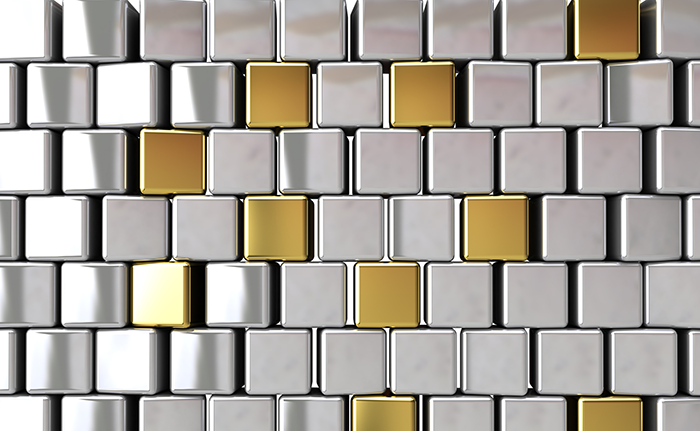What is the proper metal for CNC Machining?
When selecting the material that is best for CNC machining, there are several considerations to take into account. These factors include the melting point of the metal, its hardness and tensile strength, the weight, length and width of parts to be machined, final finish requirement of the part and any additional requirements from design and assembly standpoint.
Several key factors should be taken into consideration when determining which material best meets the requirements of a project.

- Machining Time
CNC machining time is largely determined by the type and complexity of the parts being machined. Metals with low machinability, such as stainless steel, require more time to machine than those with high precision machinability, such as aluminum. Additionally, complex parts will generally take longer to machine, thus resulting in a more expensive manufacturing process.
- Strength and Environment Requirements
CNC machining requires both strength and environmental durability for the resulting parts, as any flaws in production could lead to costly mistakes or inefficient results. Those using CNC machining must be aware of these requirements in order to guarantee the desired quality and success of their project.
Depending on what the parts or products being manufactured are meant to be used for, different materials may be better suitable. For example, steel alloy is ideal for parts that would experience a lot of loading and stress, while titanium can provide strength similar to steel but with less weight and is useful in the manufacturing of aircrafts.
- Finishing and Post-Processing
The finished product can then be further customized through post-processing techniques such as polishing, anodizing and painting to give it a unique touch without compromising the accuracy of its design.
However, the metal chosen for the parts can affect post-processing, such as finishing and polishing, which are necessary to achieve a high-quality surface finish. Soft and low machinable metals often have tooling marks and burs that require some form of post-processing. Thus, it is important to select a metal with high manufacturability if a smooth surface finish is desired. Doing so will help ensure a cost-effective manufacturing process.
How to Chose Proper Metal for CNC Machining
Different metals offer varying levels of corrosion resistance, workability, visual appeal, price and weight, so it’s important to choose the correct metal for your application. Factors such as temperature resistance and durability must also be taken into account when selecting the ideal metal for CNC machining.
- Aluminum
Aluminum material is ideal for many parts because of its low cost, high strength-to-weight ratio, and performance capabilities. Aluminum also has high machinability which allows it to be manufactured quickly and at an affordable price. Different grades of aluminum are available for CNC machining, such as aerospace grade aluminum, seafaring grade aluminum, and industrial grade aluminum.
AL6061-T6 aluminum. This grade provides excellent machinability and workability, as well as atmospheric resistance. However, it has low resistance for salt water and chemicals. Ideal for machining construction materials, aerospace components, and transportation equipment, this grade of aluminum truly offers great performance benefits to those working in the CNC industry.
Al7075-T6 is an ideal metal for CNC machining due to its strength, ductility, toughness, and fatigue resistance – all of which provide excellent durability and stability when creating high-stress structural parts.
Aluminum 6082 is one of the most commonly used materials in this process due to its superior strength and corrosion resistance, which make it ideal for use in aerospace and defense applications. The strength of this aluminum grade can be attributed to its high manganese content, which helps control its grain structure.
- Stainless Steel
Though its machinability may not be as high as aluminum, its cost for CNC machining is still economical, making it a viable option. Different grades of stainless steel are ideal for CNC machining, including but not limited to: 303, 304 & 305, 316 & 316L and 17-4 PH.
SS304 stainless steel. This durable metal alloy has excellent forming, welding and milling properties, making it ideal for creating components necessary for food processing equipment and kitchen tools/utensils. CNC machining can be used to efficiently craft detailed designs and provide reliable material strength.
SS303 stainless steel is composed of 17% chromium, 8% nickel and 0.15% sulfur, making it an ideal material for the fabrication of aircraft fittings, gears, nuts and bolts, shafts and bushings due to its excellent corrosion resistance and durability. Unfortunately, the sulfur content of SS303 prevents it from being hardened through heat treatment.
SS316 is an alloy of chromium, nickel, and molybdenum, and provides exceptional corrosion resistance and strength as well as high-temperature performance. The strength of SS316 also makes it suitable for use in many areas, including aerospace engineering, medical implants, and more.
- Brass
Brass is often used in this manufacturing process due to its high level of machinability and tensile strength, along with excellent thermal and electrical conductivity, corrosion resistance, and low temperature properties. However, brass can also be expensive and has medium hardness, which raises the cost of machining. Applications for brass made through CNC machining include electrical wiring systems, plumbing components, automotive parts, musical instruments, and medical devices.
- Copper
Copper is an ideal choice for CNC machining jobs because of its high thermal and electrical conductivity, making it great for creating electrical products, though it can be expensive. A major benefit of copper is its excellent machinability – meaning it’s easier to work with technologically than many other metals.
- Titanium
Titanium is a valuable metal due to its excellent strength-to-weight ratio, temperature resistance and chemical resistance–making it the perfect choice for medical devices or high-end automotive components. While titanium raw material may be costly, when machined with precision using CNC technology the rewards greatly outweigh the costs. On the other hand, brass also has many applications such as making electrical systems, plumbing systems, automotive parts, musical instruments and medical products. It is an expensive cost due to its medium hardness.
